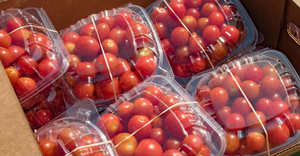March 14, 2016
The Washington Post
Recycling is so 20th century. According to one new study, there could be a new way to cut down on plastic waste: bacteria that consume one of the major components of our old bottles and clothes.
The study, published Thursday in Science, focuses on a newly-discovered bacterium called Ideonella sakaiensis. It was found outside of a bottle recycling plant, and it seems to have evolved a pair of enzymes it uses to break down polyethylene terephthalate or PET, a polymer so widely used to make plastic that about 50 million tons of it are made every year.
Because 311 million tons of plastics are produced worldwide each year — and very little of that amount makes it to recycling plants — scientists are always on the lookout for new, better ways of making PET break down when it inevitably ends up in landfills, but it's tough stuff.
You May Also Like


